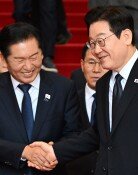Private Colleges and Universities Face Financial Crunch
Private Colleges and Universities Face Financial Crunch
Posted June. 01, 2004 22:00,
Private universities and colleges across the country are running into financial difficulties as legally required contributions to retirement pension funds and healthcare insurance have begun to bring them under pressure.
The contributions the institutions have to make are rising as wage bills for professors and employees are rising. However, the non-profit organizations see their income being chipped away at by low interest rates and the economic recession.
To add insult to injury for the already poor academic environment of the colleges and universities outside Seoul, some private institutions in the region are using parts of students tuition, which should be earmarked for educational purposes, to pay the bills.
The board of trustees at a private institution is required to pay 50 percent of healthcare insurance for employees. As for pensions, it must contribute 50 percent for employees and more than 25 percent for professors and instructors while the government contributes the rest for them. As for healthcare insurance, the burden is equally shared by corporations and the government.
--How Much to Pay
A university in Seoul put the contributions it should make to pension funds and healthcare insurance at 5.43 billion won for this year. This is about 28 percent of the 1.93 billion won it would receive from the board of trustees.
The other university paid 4.5 billion won for pensions and insurance last year, while another Seoul university paid 3.4 billion won.
The Ministry of Education and Human Resources Development estimates that 169 four-year private colleges nationwide spent 129.2 billion for pensions and insurance last fiscal year.
--Private School Teachers Pension Contributions On the Rise
The Private Teachers Pension Fund is under increasing pressure as the increasing average life expectancy is prolonging the payout period for its recipients. To get rid of its deficit, the fund will likely increase employers contributions, making private institutions bear more of the financial brunt.
Since 1975, when the fund was introduced, contribution rates have been increased just three times, a person close to the fund said. While there are no immediate plans for hikes, it is true that the increase in payouts is becoming a big burden.
--Worsening Finances at Private Institutions
An ongoing deterioration in finances at private institutions is hampering academic development.
Income is falling as its main sources, rents on the buildings we own or interest on bank deposits are falling as a result of low interest rates and the economic recession, a member of the board of trustees at a college said. We will find it difficult to finance the funds and insurance if this downward trend continues.
The picture is so grim that many institutions will see their resources being exhausted during the next several years.
To counter the burden created by the legally required contributions, the government has revised the regulations to allow the institutions to finance the contributions with the education budget they finance with tuition starting fiscal 2002.
About 68 institutions whose boards of trustees have little income paid the bill with money earmarked for education budgets. Since most of such budgets come from tuition, students are assumed responsible for the welfare of professors and school employees.
--The Government Should Intervene
The government pays for 50 percent of pension and healthcare insurance contributions for professors and instructors at public and state institutions because they are basically employed by the government.
However, it is claimed that the government should not discriminate against private universities in financial support because private institutions, which are the majority in numbers of the countrys institutions of higher learning, are playing a pivotal role in public education.
Under current law, a private college becomes a public institution once it is established, Prof. Kim Yong-ha of the department of finance and insurance at Soonchunhyang University said. The government should take over the contributions to retirement funds at least.
Seong-Chul Hong sungchul@donga.com







